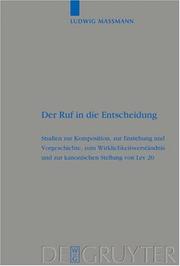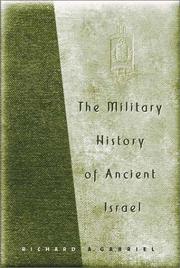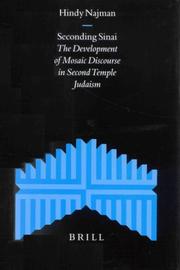| Listing 1 - 4 of 4 |
Sort by
|

ISBN: 3110176440 3110902192 9783110176445 Year: 2003 Volume: 324 Publisher: Berlin: de Gruyter,
Abstract | Keywords | Export | Availability | Bookmark
 Loading...
Loading...Choose an application
- Reference Manager
- EndNote
- RefWorks (Direct export to RefWorks)
An interpretation of Lev 20, updated for publication. In addition to classical methods of exegesis, it also uses other approaches, particularly those from cultural anthropology. The study first clarifies the scholarly prerequisites, working on the assumption that Lev 17-26 is an integral part of the Priestly Source ("P" text). The text itself is examined in both its synchronic and diachronic aspects and identified as a reader and sermon which reflects internal Jewish conflicts in the post-exile community. The whole of the formulaic content of the death sentences in Lev 20 is analysed thoroughly and discussed against the background of the thesis of "social death" (H.-P. Hasenfratz). Within the text complex of Lev 11-22, Lev 20 is concerned with irreversible impurity, which leads to exclusion from Israel, and the concluding interpretation of Israel as a people sacred to YHWH. The study closes with a theology of Lev 20 and a preview of the history of capital punishment in later Judaism. Diese für die Drucklegung aktualisierte Auslegung von Lev 20 wendet neben klassischen exegetischen Methoden auch andere, vor allem kulturanthropologische Ansätze an. Die Studie klärt zunächst die einleitungswissenschaftlichen Voraussetzungen und geht davon aus, daß Lev 17-26 integraler Bestandteil der Priesterschrift ist. Der Text selbst wird auf synchroner und diachroner Ebene untersucht und als Lese- und Predigtstück bestimmt, das innerjüdische Konflikte der nachexilischen Gemeinde abbildet. Das gesamte formelhafte Gut der in Lev 20 enthaltenen Todessätze wird gründlich analysiert und dann vor dem Hintergrund der These über den "sozialen Tod" (H.-P. Hasenfratz) diskutiert. Innerhalb des Textkomplexes Lev 11-22 geht es in Lev 20 um irreversible Unreinheit, die aus Israel ausschließt, und um die abschließende Deutung Israels als für JHWH geheiligtes Volk. Eine Theologie von Lev 20 und ein Ausblick auf die Geschichte des Todesrechts im späteren Judentum runden die Arbeit ab.
222.3 --- Exodus. Leviticus. Numeri --- Bible. --- Criticism, interpretation, etc. --- Kanon. --- Levitikus. --- Pentateuch. --- Redaktionsgeschichte. --- Todesstrafe. --- Exegese --- RELIGION / Biblical Criticism & Interpretation / Old Testament. --- Bibelauslegung --- Bibelexegese --- Biblische Auslegung --- Bibelinterpretation --- Biblische Exegese --- Schriftauslegung --- Bibelwissenschaft --- Exeget --- Bibel --- Chumash --- Five Books of Moses --- Ḥamishah ḥumshe Torah --- Ḥumash --- Kitāb-i Muqqadas --- Mose Ogyŏng (Book of the Old Testament) --- Pentateuch --- Pi︠a︡toknizhīe Moiseevo --- Sefer Ḥamishah ḥumshe Torah --- Tawrāh --- Torà (Pentateuch) --- Torah (Pentateuch) --- Tʻoris xutʻcigneuli --- Ureta --- תורה --- Haftarot --- Kitāb-i Va-yīgrā (Book of the Old Testament) --- Lāviyān (Book of the Old Testament) --- Leviticus (Book of the Old Testament) --- Lewigi (Book of the Old Testament) --- Newigi (Book of the Old Testament) --- Ṿa-yiḳra --- Ṿayiḳra (Book of the Old Testament) --- Vayikro

ISBN: 0275977986 Year: 2003 Publisher: Westport ; London Praeger
Abstract | Keywords | Export | Availability | Bookmark
 Loading...
Loading...Choose an application
- Reference Manager
- EndNote
- RefWorks (Direct export to RefWorks)
Bible. O.T. Pentateuch --- History of Biblical events --- Bible. O.T. Former Prophets --- Military history in the Bible --- Jews --- Wars --- Military art and science --- History --- To 500 --- Palestine --- History [Military ] --- Battles in the Bible --- Wars in the Bible --- Military history, Ancient --- Ancient warfare --- Hebrews --- Israelites --- Jewish people --- Jewry --- Judaic people --- Judaists --- Ethnology --- Religious adherents --- Semites --- Judaism --- Bible. --- Chumash --- Five Books of Moses --- Ḥamishah ḥumshe Torah --- Ḥumash --- Kitāb-i Muqqadas --- Mose Ogyŏng (Book of the Old Testament) --- Pentateuch --- Pi︠a︡toknizhīe Moiseevo --- Sefer Ḥamishah ḥumshe Torah --- Tawrāh --- Torà (Pentateuch) --- Torah (Pentateuch) --- Tʻoris xutʻcigneuli --- Ureta --- תורה --- Haftarot --- Former Prophets --- Neviʼim rishonim --- Profetas primeros --- Prophetae Priores --- History of Biblical events. --- Holy Land --- History, Military.
Book
ISBN: 8821809013 Year: 2003 Volume: vol. XVII, fasc. 2
Abstract | Keywords | Export | Availability | Bookmark
 Loading...
Loading...Choose an application
- Reference Manager
- EndNote
- RefWorks (Direct export to RefWorks)
220 --- Religion Bible --- Ibn Ezra, Abraham ben Meïr, --- Malanima, Cesare --- Aben Ezra, Abraham ben Meir, --- Abraham Avenare, --- Abraham ben Ezra, --- Abraham ben Meir Aben Ezra, --- Abraham ibn Esra, --- Abraham ibn Ezra, --- Abraham, --- Avenare, Abraham, --- Avraham ben ʻEzra, --- Avraham ben Meʼir, --- ʻE., R.A.b., --- Esra, Abraham ibn, --- Even ʻEzra, --- Ezra, Abraham ben, --- Ezra, Abraham ben Meir Aben, --- Ezra, Abraham ibn, --- Ezra, Aven, --- ʻEzra, Even, --- Ezra, Ibn, --- Ibn Esra, Abraham, --- Ibn Ezra, --- Ibn Ezra, Abraham, --- Meir, Abraham ben Aben Ezra, --- Meʼir, Avraham ben, --- R.A.b. ʻE., --- Raʼavaʻ, --- Rabaʻ, --- Ravaʻ, --- Sefaradi, Avraham ben Meʼir, --- Spaniard, Abraham, --- אברהם אבן עזרא --- אברהם עזרא הספרדי --- אברהם ן׳ עזרא --- אברהם ן׳ מאיר, --- אברהם בן עזרא --- אברהם בן מארי, --- אברהם בן מאיר הספרדי המכונה בן עזרא --- אברהם בן מאיר הספרדי המכינה בן עזרא --- אבן עזרא --- אבן עזרא, אברהם --- אבן עזרא, אברהם בר מאיר --- אבן עזרא, אברהם ב״ר מאיר הספרדי --- אבן עזרא, אברהם בן מאיר --- אבן עזרא, אברהם בן מאיר, --- אבן עזרה, אברהם בן מאיר --- ראב״ע --- ן׳ עזרא, אברהם --- בן עזרא, אברהם --- בן עזרא, אברהם בן מאיר --- Influence. --- Criticism and interpretation. --- Bible. --- Chumash --- Five Books of Moses --- Ḥamishah ḥumshe Torah --- Ḥumash --- Kitāb-i Muqqadas --- Mose Ogyŏng (Book of the Old Testament) --- Pentateuch --- Pi︠a︡toknizhīe Moiseevo --- Sefer Ḥamishah ḥumshe Torah --- Tawrāh --- Torà (Pentateuch) --- Torah (Pentateuch) --- Tʻoris xutʻcigneuli --- Ureta --- תורה --- Haftarot --- Commentaries --- Litterature juive --- Moyen age --- Histoire et critique

ISBN: 9004115420 9786610464142 1417597593 1280464143 9047400283 9781417597598 9789004115422 9789047400288 Year: 2003 Volume: 77 Publisher: Leiden Boston Brill
Abstract | Keywords | Export | Availability | Bookmark
 Loading...
Loading...Choose an application
- Reference Manager
- EndNote
- RefWorks (Direct export to RefWorks)
This work criticizes the terms ""Pseudepigraphy"" and ""Rewritten Bible"", which presuppose conceptions of textual fidelity foreign to ancient Judaism. It develops the concept of a discourse whose creativity and authority depend on repeated returns to the exemplary figure of a founder.
Direct discourse in the Bible --- Directe rede in de bijbel --- Discours direct dans la bible --- 222.1 --- Jewish law --- -Judaism --- -Discourse, Direct, in the Bible --- Jews --- Religions --- Semites --- Biblical law --- Civil law (Jewish law) --- Halacha --- Halakha --- Halakhah --- Hebrew law --- Law, Hebrew --- Law, Jewish --- Law, Mosaic --- Law in the Bible --- Mosaic law --- Torah law --- Law, Semitic --- Commandments (Judaism) --- Octateuch. Heptateuch. Hexateuch. Pentateuch. Boeken van Mozes --- Interpretation and construction --- -History --- -Religion --- Religion --- Law --- Moses (Biblical leader) --- Judaism --- Discourse, Direct, in the Bible --- Hellenistic Judaism --- Judaism, Hellenistic --- History --- Moses --- Moïse --- Moiseĭ --- Moisés --- Mosè --- Mosheh --- Mosheh, --- Mosis --- Moyshe, --- Mózes --- Mūsá --- Nabī Mūsá --- משה --- משה, --- Bible. --- Chumash --- Five Books of Moses --- Ḥamishah ḥumshe Torah --- Ḥumash --- Kitāb-i Muqqadas --- Mose Ogyŏng (Book of the Old Testament) --- Pentateuch --- Pi︠a︡toknizhīe Moiseevo --- Sefer Ḥamishah ḥumshe Torah --- Tawrāh --- Torà (Pentateuch) --- Torah (Pentateuch) --- Tʻoris xutʻcigneuli --- Ureta --- תורה --- Haftarot --- Criticism, interpretation, etc., Jewish. --- Bible. O.T. Pentateuch --- Criticism, interpretation, etc. [Jewish ] --- To 1500 --- Post-exilic period, 586 B.C.-210 A.D. --- Direct discourse in the Bible.
| Listing 1 - 4 of 4 |
Sort by
|

 Search
Search Feedback
Feedback About UniCat
About UniCat  Help
Help News
News